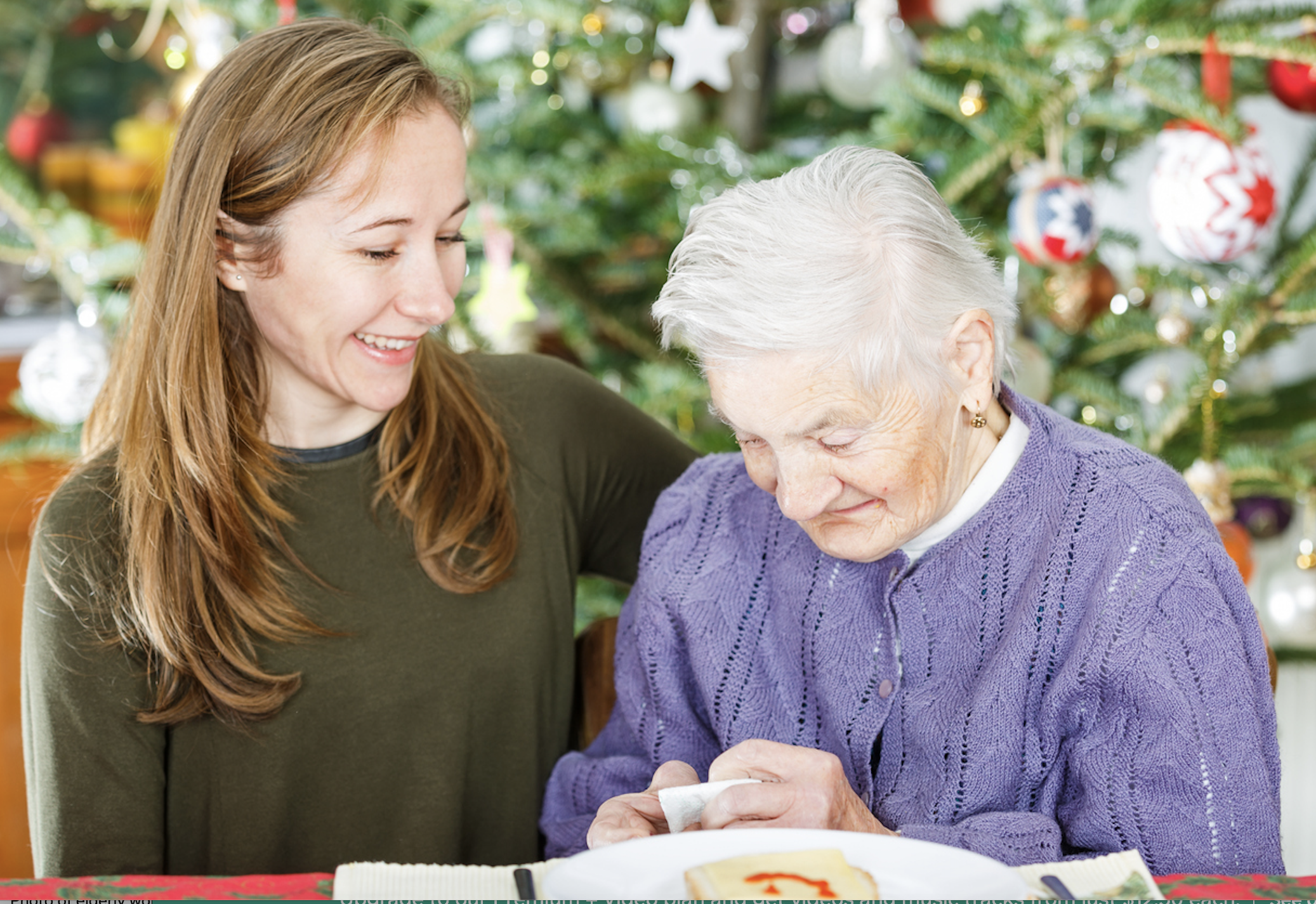

By Kristina Lubofsky
My Grandpa Fred loved the holidays. He would sit at the head of our Christmas dinner table, gesture to everyone, and say “Gee, isn’t this wonderful, us all together like this?” It wasn’t about the gifts, the decorations, or even the food: It was about us all being together.
But two years into his Alzheimer’s journey, Christmas looked a lot different to him. We have a big, loud family. We love to talk over each other with multiple conversations happening at once. We love to play games, we love to eat (and eat… and eat some more…). We thought we were doing the right thing to include him in the celebrations by keeping all our traditions alive and gathering together in the same way he had always loved.
But when we gathered together to open gifts, everyone laughing and wrapping paper flying across the room, he held his gift and looked at me, worried. “Won’t it all fall out all over the floor?” he kept asking me. I assured him that it was a gift for him to open, but he was convinced whatever was inside was either sand or liquid and would fall out all over the floor, and nothing could convince him otherwise. I looked around the room through his eyes and saw a very different scene: it was crowded and loud inside my parents’ living room. People were tearing apart boxes without knowing what was inside. His senses were completely overstimulated, and it was terrifyingly overwhelming for him.
We took his gift into another room, unwrapped it, and handed him the open box with shirts inside. He was a different person away from all the chaos, knowing what gift he was being given. That experience taught me so many lessons about how to navigate the holiday season with someone living with dementia.
Keep it small and quiet
Lots of loud voices and chaos felt like second nature to our family, but it wasn’t what was best for Grandpa Fred. He had enough trouble following what was going on with one person, and when you multiply it by fifteen or twenty, it’s downright intimidating. Too many voices will distract from the experience. Your loved one may have trouble following a conversation, so they won’t participate, and in turn, they get lost in the shuffle. One activity at a time, and take it slow.
Don’t put Mom in the corner
Just because your loved one with dementia may not be able to participate in the same way they used to doesn’t disqualify him or her from being included in activities. You can adapt activities to make them inclusive by giving your loved one tasks that don’t have a right or wrong way of doing them, while also removing any kind of danger.
For example, you may ask them to fold napkins, set the table with forks and spoons (but no knives), or hang non-breakable ornaments on the tree. You could use remote-controlled LED candles in your menorah and let your loved one press the button to light the candle so there’s no flame.
Music
Music has a mysterious quality of reconnecting people with familiarity. Feel free to play familiar holiday songs, especially ones from their past, and you just may hear them singing along merrily!
Gift giving
Grandpa Fred thought his gift would spill out if he opened it. He couldn’t figure out why he was supposed to open it, and in retrospect, he probably had some anxiety wondering why we were all doing it. Mitigate that anxiety by placing gifts in bags or just using a simple bow. It may remove the element of surprise, but it may also remove any embarrassment or anxiety your loved one feels having to open a gift.
Put a time limit on it
Too much stimulation can exhaust your loved one. Even after we calmed Grandpa Fred down in the other room, the events of the day were just too much for him. Our holiday gatherings can go on for hours – we’ve been known to clean up dessert and take out the leftovers while playing games – but we had to adjust. Which brings me to my next learned lesson…
Daytime is better than evening get-togethers for those who sundown
We started eating a bit earlier in the day and then brought Grandpa Fred and Grandma Carol back home before the sun went down. Just an hour or two was enough for Grandpa, and it also provided a respite for the rest of his family full of caregivers.
Traditions reign supreme
Traditions can be a source of comfort, and that’s what your loved one with dementia needs most right now. Some things can be adapted (like using paper plates instead of fine china to cut down on the number of dishes for caregivers to do), and some things should be adapted (like minimizing distractions). But sticking to family traditions could help your loved one feel more at ease, and therefore, be in that jolly good mood you’re hoping for.
The holiday season is one that’s highlighted by joy and good cheer – but for those caring for a loved one with dementia, it’s also one fraught with stress and anxiety. The unpredictable nature of dementia can make the holidays a bit trickier, but with some planning, adjustment, and flexibility, it can still be a joyful experience.
Kristina Lubofsky, MS, is a gerontologist certified in brain health and dedicated to enriching the lives of older adults. She’s had three Alzheimer’s diagnoses in her family: her father’s mother and her mother’s parents. It inspired her to create a company that distributed activities designed to promote learning, better brain health, and quality of life for older adults. Now, she runs a support group for caregivers of those living with dementia through the Alzheimer’s Association and advocates for dementia care and better brain health through her writing.